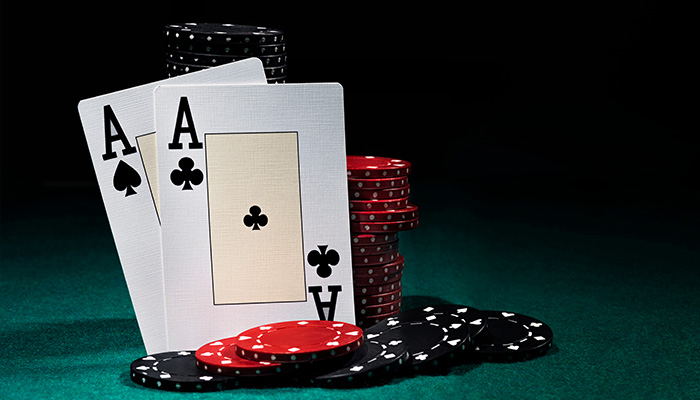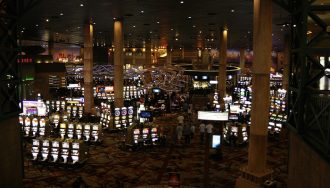Poker’s Black Friday: Everything You Need to Know
 Poker’s Black Friday
Poker’s Black Friday
- What Was the Black Friday Online Poker Scandal?
- How the Black Friday Poker Saga Unfolded
- Prosecution and Legal Battles Post-Scandal
- The Aftermath: How Poker Sites Survived
- What Did the UIGEA Actually Say?
- How Players Were Affected by Black Friday
- Frequently Asked Questions
What was Black Friday? And no, we’re not talking about the shopping holiday, we’re talking about the biggest scandal to ever hit the online poker world. This infamous day has gone down in history, as a snowball chain of events led to the federal government introducing new legislation that effectively banned all forms of online gambling in the USA.
Today, we’re going to show you exactly what Black Friday was, how it happened, and what the ramifications were. We’ll also look at how it impacted the online poker industry, both in the US and globally, and how things look today.
What Was The Black Friday Online Poker Scandal?
The online poker Black Friday is seen, by many, as the bleakest day in the history of poker. On April 15, 2011, the US Department of Justice indicted three of the biggest online poker sites – PokerStars, Full Tilt Poker, and Cereus Network – for violating the Unlawful Internet Gambling Enforcement Act, known as UIGEA. Poker players were immediately locked out of their accounts, and the sites faced charges including bank fraud and money laundering.
The DOJ seized the domains of these poker sites, freezing their operations, and the move sent shockwaves through the global poker community. The series of events that followed would forever change the landscape of online poker.
How the Black Friday Poker Saga Unfolded
The online poker Black Friday was a well-planned crackdown on illegal online gambling by US law enforcement. The three main players in the online poker world – PokerStars, Full Tilt Poker, and Cereus – were found guilty of breaching the Unlawful Internet Gambling Enforcement Act. Essentially, they were accused of tricking banks into processing payments for illegal online gambling.
In the early hours of April 15, 2011, the DOJ and the FBI seized the domain names of these poker sites. Players attempting to log into their accounts were met with a DOJ seizure notice, and they were unable to access their funds, causing a mass panic in the industry. The founders of all three poker sites were indicted, along with eight others. They were collectively charged with bank fraud, money laundering, and running illegal online gambling operations.
The prosecution argued that these poker sites had used fraudulent methods to circumvent federal law and trick banks into processing payments for them. According to the court filings, the sites had created fake online merchants that they told banks sold items including jewelry and golf balls. This allowed them to accept payments through US banks, which was illegal at the time for online gambling.
In even more severe charges, some of the accused were found to have laundered money from US players through hundreds of non-existent companies to try and clean it. According to the prosecution, this was a clear-cut case of money laundering.
However, the drama didn’t end there, as Full Tilt Poker was, shortly after, accused of operating a Ponzi scheme. The Black Friday poker revelations revealed the site had misused player funds, using new players’ deposits to pay out withdrawals to players who’d been owed deposits for some time; during this time, they maintained a shortfall of around $330 million.
The Black Friday online poker scandal shook the online poker community, but it went well beyond that, too. Many saw it as a direct confrontation between the U.S. government and the thriving industry of online poker, an industry that had been operating in murky gray legal territory for a number of years.
Prosecution and Legal Battles Post-Scandal
The legal battles that would be fought after Black Friday were complex, lengthy, and expensive. The U.S. government sought billions of dollars in damages and penalties from the companies and those indicted, although the most focus was placed on Full Tilt Poker.
As the site was accused not only of violating gambling laws but also of running a Ponzi scheme, its executives faced serious charges, including money laundering and wire fraud. A breakdown of some of those charged can be seen below:
| Defendant | Sentence |
|---|---|
| Isai Scheinberg | $30,000 fine |
| Paul Tate | $119,000 fine |
| Ray Bitar | $40 million fine and time served |
| Scott Tom | $300,000 fine |
| Ryan Land | Time served |
As is common with financial crimes, most of the defendants ended up reaching financial settlements with the DOJ. PokerStars, for example, agreed to forfeit $547 million to the government, while paying back around $184 million owed to Full Tilt’s players. As a result of this settlement, PokerStars acquired Full Tilt Poker.
The drama and controversy caused by the Black Friday online poker scandal had lasting implications. It was used by the US government as a platform to try and introduce even stricter regulations for players to play poker online effectively making it impossible for most states to offer legal online gambling.
The Aftermath: How Poker Sites Survived
The aftermath of Black Friday was challenging for online poker. The market shrunk insanely quickly as companies withdrew from the US. Even companies which had no physical ties to the US quickly left the market, worried the DOJ and the US government would come after them – something that was possible given America’s extraordinary power around the world.
However, it wasn’t bad news for all companies. Below, we’ll show you what happened to some of the major poker sites that were operating in the US at the time of the Black Friday poker scandal:
| Poker Site | Post Black Friday Action |
|---|---|
| PokerStars | Acquired Full Tilt Poker, paid player debts |
| Full Tilt | Assets bought by PokerStars |
| Absolute Poker | Went out of business |
| Partypoker | Voluntarily withdrew from US before Black Friday, re-entered post-regulation |
| WSOP | Emerged as a significant player in regulated US market |
Sites like PokerStars and Partypoker adapted, targeting markets outside the US and focusing on countries with clear legal guidelines. Others, like WSOP, capitalized on adhering to strict new regulations to establish a strong presence in the US market.
What Did The UIGEA Actually Say?
Contrary to what many believe, the UIGEA didn’t make online gambling illegal. What it did was make it illegal for businesses to process financial transactions related to unlawful gambling. Complications arose as the law didn’t define what unlawful gambling actually meant, which led to a few non-US-based poker companies continuing to operate in the US market even after Black Friday had happened.
Together, they pointed to a 2002 Court of Appeals case where a judge had warranted that the Federal Wire Act only related to sports betting. As a result, they claimed that online poker was not an unlawful form of online gambling, so, they claimed, they were free to continue operating as normal.
Things continued to remain murky, with just three states officially going ahead and legalizing online poker post-Black Friday: New Jersey, Delaware, and Nevada. But in recent years, the landscape surrounding online gambling has changed, with over 30 states now having legalized betting and gambling online in one form or another, although only six have legalized online poker.
However, each state is required to regulate online gambling, and this means strict new laws have been brought in. These require online poker sites to obtain valid licenses and adhere to strict regulations. They aim to prevent a repeat of the Black Friday scandal, ensuring the safety of player funds and fairness in games.
How Players Were Affected by Black Friday
Players were among those most affected by Black Friday. The seizure of the major poker sites left them in limbo, with an estimated 95% of US players unable to access their funds. Some had thousands, even millions, of dollars locked in their accounts. Unfortunately, it took years for poker players to receive back money they had deposited, with many unable to reclaim the full amount they were owed, even to this day.
While some players chose to play at offshore sites (which were also operating in grey areas and at risk of the US government coming after them at any time), others chose to give up online poker completely or make radical changes. Many players were professionals, so they earned a living from the game, and after Black Friday, they were forced to move overseas or play live poker at a land-based casino.
Many players had their entire bankrolls frozen, and there were reports of some players having their whole net worth locked on their poker accounts. It was a terrible time for players, and, as mentioned, it took many years for players to reclaim part of their funds, if at all.




